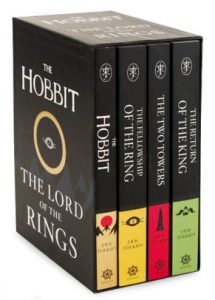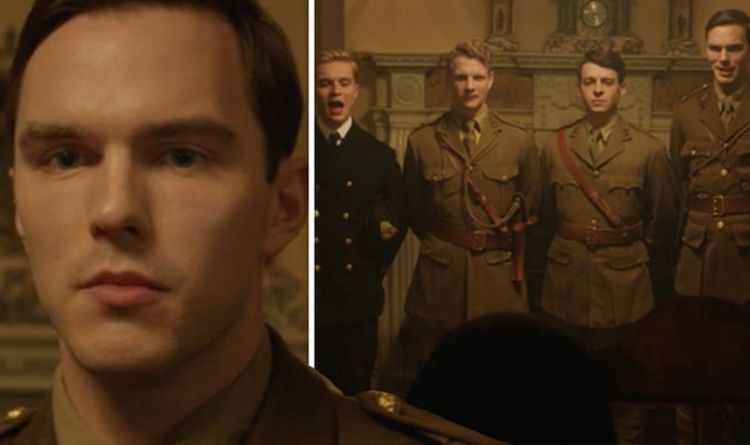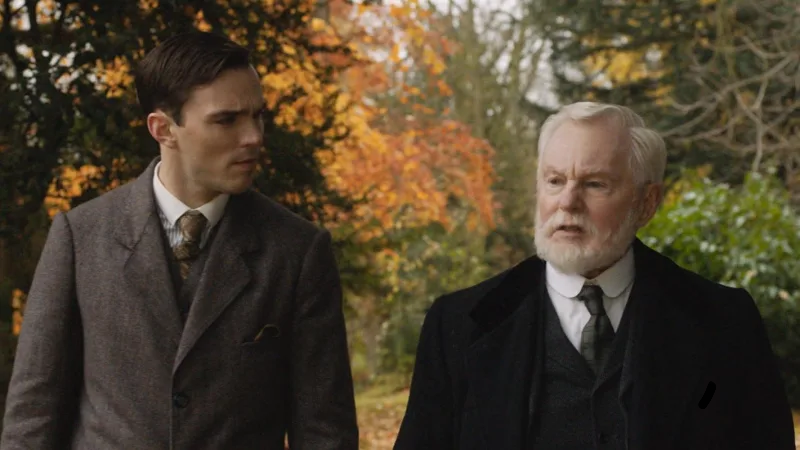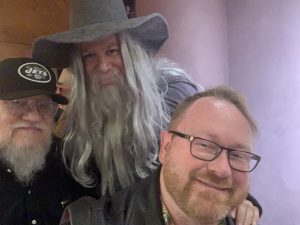By GREG TALLY — special to TheOneRing.net
 At best, I am a casual fan of the works of John Ronald Reuel Tolkien. In the 1980s, I experienced the same tween discovery of Tolkien’s books that remains a touchstone for many fans. On a long Greyhound trip from Baltimore to Colonial Williamsburg with my father, I read Fellowship of the Ring; I sat on the edge of my bus seat in the Mines of Moria, mourned Gandalf’s demise and the shattering of the Fellowship. With a hunger worthy of Gollum, I devoured the rest of the trilogy, followed by The Hobbit. And when I clapped shut my Ballantine Books paperbacks; I felt the real sense of loss of close friends. I did not want Middle-earth, Sam and Frodo and all the rest to go away.
At best, I am a casual fan of the works of John Ronald Reuel Tolkien. In the 1980s, I experienced the same tween discovery of Tolkien’s books that remains a touchstone for many fans. On a long Greyhound trip from Baltimore to Colonial Williamsburg with my father, I read Fellowship of the Ring; I sat on the edge of my bus seat in the Mines of Moria, mourned Gandalf’s demise and the shattering of the Fellowship. With a hunger worthy of Gollum, I devoured the rest of the trilogy, followed by The Hobbit. And when I clapped shut my Ballantine Books paperbacks; I felt the real sense of loss of close friends. I did not want Middle-earth, Sam and Frodo and all the rest to go away.
My love for Tolkien remained more emotional than intellectual. I lamely thumbed through the Appendices, but could not absorb Tolkien’s encyclopedic worldbuilding. I didn’t have the patience for The Silmarillion, never learned Elvish, and if I’m brutally honest, impatiently skipped over most of Tolkien’s embedded poems for halting the plot. Like millions of other fans, I allowed Peter Jackson’s movies to colonize my mind’s eye of Tolkien’s characters. But outside of that; no Ralph Bakshi, no Rankin and Bass, no Leonard Nimoy crooning, “Bilbo – Bilbo Baggins, bravest little hobbit of them all.” As a sometimes fan, I could take Tolkien or leave him.
And yet, Finnish Director Dome Karukoski’s Tolkien forges a singular movie alchemy of its own. Like a treetop wizard lighting pinecones to chuck at wargs, Karukoski ignites the passion and fun of that childhood first read of Tolkien’s most famous works. This movie is a “How-Done-It,” explaining the many real life experiences and influences that lead Tolkien to put ink to paper. Even in the face of the massive loss of childhood chums in World War I, the most cathartic moment of the movie is Tolkien writing simply, “In a hole in the ground there lived a Hobbit.” This openly brought me to tears, and reminded me of the childlike, pure emotion of first falling in love with Middle-earth. Rekindling that love alone is reason enough to see this movie. And yet there’s so much more, thematically.
 We follow a young Tolkien through the blood and the mud of the Battle of the Somme, trailed by a faithful British Private as an analogue for Samwise Gamgee. Amidst the barbed wire and the mustard gas and flamethrowers of trench warfare, Tolkien glimpses dragons and Balrogs and Ringwraiths, and conjures the imagery that will form the basis of his mythological evil. This is the realm of machinery run amok to commit mass slaughter.
We follow a young Tolkien through the blood and the mud of the Battle of the Somme, trailed by a faithful British Private as an analogue for Samwise Gamgee. Amidst the barbed wire and the mustard gas and flamethrowers of trench warfare, Tolkien glimpses dragons and Balrogs and Ringwraiths, and conjures the imagery that will form the basis of his mythological evil. This is the realm of machinery run amok to commit mass slaughter.
But we also see a younger Tolkien form a literary club and close friendship of four with his fellow students. This fellowship lasts through college at Oxford and Cambridge and is shattered in the War to End All Wars. Karukoski walks us through the dual tensions of kinship and human decency versus man’s implacable killing technology that shaped so much of Tolkien’s worldview. And the movie deserves praise for its depiction of the strong women in Tolkien’s life, including his mother, Mabel.
 Rarely has a movie explored the meaning and function of language in such a sensitive and romantic light. Words and their inherent magic are front and center as Tolkien invents entire languages and studies to be a philologist. Both Tolkien’s future wife Edith Mary Bratt, and his Gothic Professor Joseph Wright help young Ronald explore language in thought-provoking ways.
Rarely has a movie explored the meaning and function of language in such a sensitive and romantic light. Words and their inherent magic are front and center as Tolkien invents entire languages and studies to be a philologist. Both Tolkien’s future wife Edith Mary Bratt, and his Gothic Professor Joseph Wright help young Ronald explore language in thought-provoking ways.
Actor Nicholas Hoult gives a nuanced performance of a sensitive and romantic artist. Lily Collins is exceptional as Edith. Other standout performances include Colm Meaney as a stern-yet-loving Father Francis, and Derek Jacobi as our Gandalf stand-in, Professor Wright.
Yes, the movie takes dramatic license with Tolkien’s timeline, and downplays his devout Catholicism. This remains a straight forward, satisfying biopic packed with ideas and themes as rich as Tolkien’s vision. Just like Bohemian Rapsody did (and no doubt Rocket Man will, in a few weeks), this is a largely sympathetic portrait of a rock star; in this case a literary one in Tolkien. And even more fun – for a brief shining moment – is reentering The Shire, and remembering what it is to be a kid again.
Greg Tally lives in Denver, Colorado, and owns the Dinosaur Hotel (Best Western Denver). He is founder of the Rondo Hatton –winning podcast, The Revival League, and author of Soylent Scrooge: Or Christmas Is Made of People.



